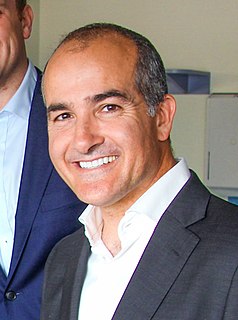A Quote by Dan Schulman
Too many people go into existing organizations and define success as recreating what is there. To be successful as a startup organization within a large, established culture, you really need to think about how you leverage the assets that are there.
Related Quotes
Talking about improving the culture, I prefer to say "develop" or "evolve" rather than "change". If I walk into a room and say: "we are here to change the organization," it sends shock waves through the group. If I say: "your success to date has come from who you are, to be successful in the future, we need to get to X, let's talk about how we evolve the organization to that point," that is a very different statement. Successful organizational "change" must come from the people. So, recruit them with common purpose, recognize that it will take time, and plow forward.
To be successful, it is imperative that you not only know the organizations you work with, but more specifically, you have to know the actual people you work with within these organizations, understand what their personal goals and motivations are. In short, to be successful, you need to humanize your clients.
One of the difficulties in bringing about change in an organization is that you must do so through the persons who have been most successful in that organization, no matter how faulty the system or the organization is. To such persons, you see, it is the best of all possible organizations, because look who was selected by it ad look who succeeded most in it. Yet, these are the very people through whom we must bring about improvements.
Consider the many financial industry executives who walked away with many millions as their organizations failed - I think the expression is "failing upward." People also need to understand that their "technical" job performance is correlated with their career success, but again, many other factors such as educational credentials, length of service, and yes, political skills, also contribute to success. So people need to understand business and technical issues but they also need to master organizational dynamics.
Every organization needs to be introspective, transparent, and honest with itself. This only works if everyone is unified on the goals and purposes of the organization and there is trust within the team. High-performing, successful organizations build cultures of introspection and trust and never lose sight of their purpose.
I have participated as a leader in many organizations where the leadership culture was just mean - ugly, where competitiveness, and destructive relationships stymied progress. There should be healthy tension and candid debate, but leadership teams need to practice communication, relationship building, emotional intelligence, and be aligned around common purpose to achieve organizational success. Senior leaders, chief executive officers, others need to ensure they are fostering the right environment for leadership otherwise all of that ugliness will trickle through the organization.































